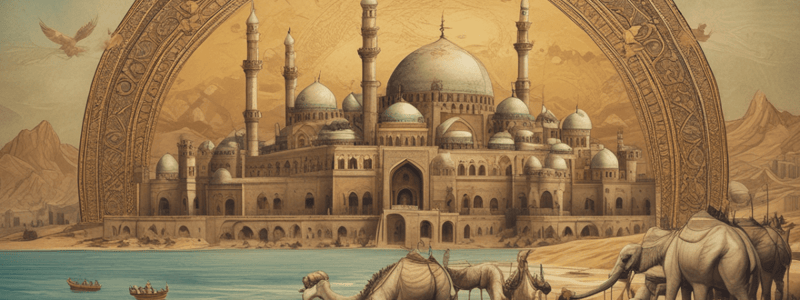Podcast
Questions and Answers
True or false: Muhammad united the people of the Arabian Peninsula through Christianity.
True or false: Muhammad united the people of the Arabian Peninsula through Christianity.
False (B)
True or false: Four caliphs from Muhammad's tribe conquered vast areas beyond Arabia, including the Persians and the Byzantines, without any opposition.
True or false: Four caliphs from Muhammad's tribe conquered vast areas beyond Arabia, including the Persians and the Byzantines, without any opposition.
False (B)
True or false: The Umayyad Dynasty extended the empire's reach from present-day Spain to India and stabilized it by replacing ruling elites with Muslim officials.
True or false: The Umayyad Dynasty extended the empire's reach from present-day Spain to India and stabilized it by replacing ruling elites with Muslim officials.
True (A)
True or false: The Abbasid family established themselves as the new rulers, relocating the capital to Cairo.
True or false: The Abbasid family established themselves as the new rulers, relocating the capital to Cairo.
True or false: Under Abbasid rule, extensive trade networks brought cultural and scientific advancement, and the caliph enjoyed no wealth or power.
True or false: Under Abbasid rule, extensive trade networks brought cultural and scientific advancement, and the caliph enjoyed no wealth or power.
True or false: The Mongols destroyed Baghdad in 1258 CE, laying bare the symbolic rule of the caliphs and the growing power of local leaders throughout the empire.
True or false: The Mongols destroyed Baghdad in 1258 CE, laying bare the symbolic rule of the caliphs and the growing power of local leaders throughout the empire.
True or false: The Islamic Empire's influence through Arabic language, Buddhism, and its warriors left a lasting mark on the world.
True or false: The Islamic Empire's influence through Arabic language, Buddhism, and its warriors left a lasting mark on the world.
Flashcards are hidden until you start studying
Study Notes
- Muhammad united the people of the Arabian Peninsula through Islam and formed a political and religious empire with Medina as its heart.
- Four caliphs from Muhammad's tribe conquered vast areas beyond Arabia, including the Persians and the Byzantines, but dissent grew and a civil war erupted.
- The Umayyad Dynasty came to power, extending the empire's reach from present-day Spain to India and stabilizing it by replacing ruling elites with Muslim officials.
- The Abbasid family overthrew the Umayyad caliphate and established themselves as the new rulers, relocating the capital to Baghdad.
- Under Abbasid rule, extensive trade networks brought cultural and scientific advancement and the caliph enjoyed immense wealth and power.
- Succession was not clearly defined, leading to power struggles, favoritism, and corruption.
- The Mongols destroyed Baghdad in 1258 CE, laying bare the symbolic rule of the caliphs and the growing power of local leaders throughout the empire.
- The Islamic Empire's influence through Arabic language, Islam, and its intellectuals left a lasting mark on the world.
Studying That Suits You
Use AI to generate personalized quizzes and flashcards to suit your learning preferences.




